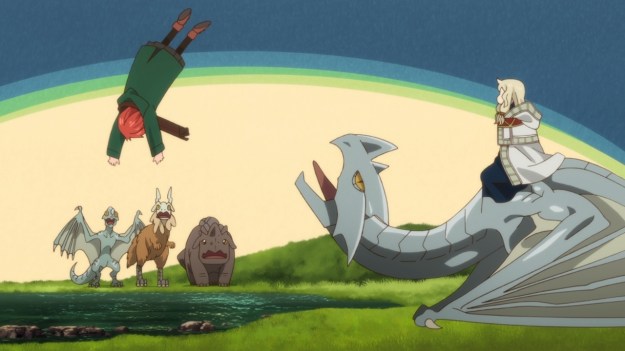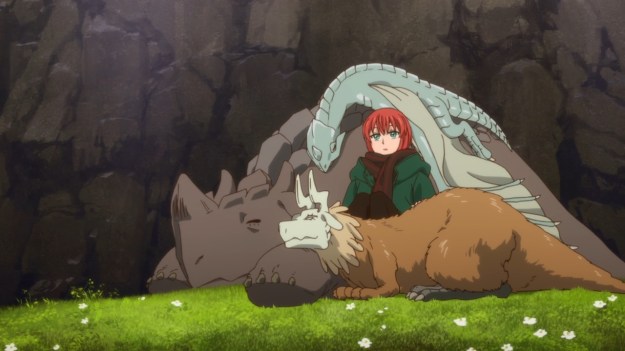When Chise comes to, she finds herself in the mouth of a dragon. If you’ll recall, last week’s episode ended on a bit of a cliffhanger. A silver-haired stranger swooped in from out of nowhere and absconds with Elias’s Asian bride apprentice. We find out quickly that Lindel (also known as Echos) is not a bad guy; he and Elias are even allies. He just likes to mess with people, and I guess a staged kidnapping is just one of his many tried-and-tested pranks. Plus, even if Lindel had harbored malicious intentions, Chise was never in any real danger. Being a powerful magus means Elias was with her every step of the way, this time hiding within her shadow. After some brief banter, the men leave to discuss important matters, leaving the girl behind to hang out with the children. Hm.
So still without an antagonist, the story falls back on its world-building and character development. As a traumatized individual most likely also suffering from depression, Chise does what most characters often do in her position: she plays. I’ve written about play and trauma before, so I really don’t want to rehash the topic. Nevertheless, here are some quoted passages that might be interesting:
The developing child’s positive sense of self depends upon a caretaker’s benign use of power. When a parent, who is so much more powerful than a child, nevertheless shows regard for that [child]… the child feels valued and respected; she develops self-esteem. She also develops autonomy, that is, a sense of her own separateness within a relationship. She learns to… express her own point of view.
…eminent theorists have emphasized the value of abreactive play for children… children in play reconstruct, reenact, and reinvent their stressful experiences in order to understand them, assimilate their reality, and achieve mastery over them. Through play, children can adopt roles that were not part of real experiences… and, thus, master difficult life situations.
Those aren’t my words, by the way. Obviously not since they’re actually well-written and everything. Nope, these are words from actual experts. I merely used them to analyze anime — Arakawa Under the Bridge, to be specific. I still find those passages relevant now, which is fitting in my mind because I still very much see the girl as both physically and emotionally a child. Chise thus plays with the dragons, and that’s probably the most wholesome takeaway from this so-called honeymoon.
After the little dragons tire themselves out, Chise finally gets some one-on-one time with Nevin, an ancient dragon who is ready for his life to end. But death for dragons is apparently a peaceful, beautiful event. They simply turn into the trees and boulders that you see around you. They return to nature, more or less, and one need not grieve for them. Nevin intrudes on Chise’s memories, so to make it up to her, he invites her into his final dream. Within it, she and Nevin soar through the clear skies blessed by a sunset. The whole moment is supposed to be magical and transcendent; you’ve even got an insert song to highlight the moment. I’ll give my personal thoughts on it later.
After the shared dream, Nevin transforms into a majestic tree. So in Nevin, you have something akin to a parental figure. Not only does he impart wisdom and passes the torch along by imploring her to turn one of his branches into a magic wand, more importantly, his passing away is not something to lament. This goes against Chise’s past experiences, which is important if the laconic girl is to ever recover from her past traumas. Although she is envious that the dragon could pass away so peacefully, she is still touched by his kindness.
And none of this would’ve been possible, however, without Chise’s vast potential as a Sleigh Beggy. Nevertheless, she’s a frail girl untrained in the ways of magic, so she hasn’t got long to live if things remain as they are. By the end of the episode, the whole ordeal seems to have taken a toll, and Chise collapses to the ground. Lindel carefully reminds Elias that she won’t have more than three years at this rate. Elias responds with annoyance that he knows just how grave the situation is, but he hasn’t really done a great job in preventing the girl from inadvertently using her powers.
Well, I know logically that this episode contained scenes that were important to our heroine’s slow and steady progress towards recovery, but it still bored me to hell. As soon as it ended, I went back to rewatch some of the important moments; I felt as though I had missed something. In the end, I couldn’t find what that “something” was. For example, her moment with Nevin seemed forced and overwrought. But unfortunately, I’m stubborn. I know people will be like, “This is not your type of anime. You should stop watching it.” But I refuse. So instead, I invite you to tell me what you like about Mahoutsukai no Yome’s first three episodes. What do you find particularly impressive or touching about them?



Just look at the pretty picture. I don’t know about how that scene played out in the anime, but the manga rendered that scene in a beautiful manner. If you’re looking for some deep, smart, or thoughtful message, this isn’t that kind of story. The fact that I find this scene that is important to the development of Chise as a character to be more style than substance is one of the main reasons why I find Chise’s development to be lame.
I don’t know what that “something” is that for you, E Minor. For me, it’s definitely epiphany, though. Just like me who only find the scene to be beautiful, Chise also only find the scene to be beautiful and it’s kinda lame, is not it? I guess the scene is meant to show to her (and me) that the world isn’t just gloom, but also beautiful and her life is worth living, but it just doesn’t take. In the manga, the scene is beautiful but still not enough to dazzle me and far too short to boot. Don’t know about the anime.
It doesn’t have to be deep nor smart. Just emotionally engaging. I find girls like Chise so tiresome, though.
Chise and Elias are dull and boring, so I think it’s hard to be emotionally engaged to them or their stories or it’s just me. It’s why I focus more on the world and the side characters than those two.
If the side characters also don’t work for you, I guess it’s just not meant to be. The side characters themselves aren’t exactly ground-breaking, but the writer just seem to be more bold with them, so they are more colorful and interesting than those two white-bread, tiresome main characters.
It is fine if you don’t like it. I also found this third episode a little lacking in the story department, though visually it was stunning and there is still some great world building going on. Overall, I am really loving this show, but I won’t deny there are some parts of this episode that kind of drag.
So far, I find myself having the same issue that I did with the manga: I just can’t make myself feel invested in anything. Maybe it’s the pacing, which feels off to me (though nowhere near as bad as the manga), or the stories that don’t seem to really relate much to each other or the characters beyond “well, that happened I guess.” And this is coming from someone who adores the likes of Aria, Mushishi, and Natume’s Book of Friends. Which is kinda sad to me, because this sort of show should be my cup of tea. A mid-fantasy story wrapped in slice of life trappings? Sign me up! But… it just never seems to meld with its own components, and the fact that the same issues are cropping up in the anime makes me think that it’s something that never goes away. Which is sad, because I really want to like it. :/
Well, this seems to be her second manga series so it is not surprising the writing might be clunky.